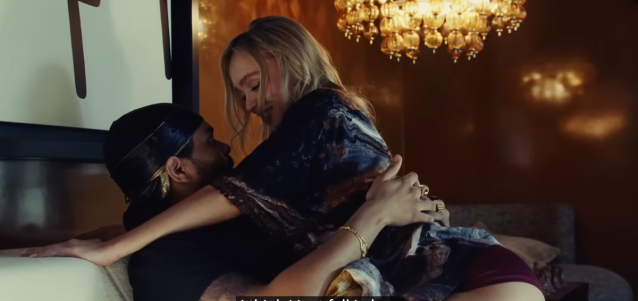From Sam Levinson, the brilliant mind behind the Zendaya-led Euphoria, The Idol aims to strike a similar critical chord — commenting on the toxic underbelly inherent to the popstar industry. Yet, rather than satirizing or criticizing the sexist, too-cool-for-school workings of the industry, it glamorizes it. It places the sleaziest aspects of the music world on a stage to be worshipped — like the very pop star it drowns in regressive edginess.
The Idol brings viewers into the world of sex, drugs, and rock & roll in a way that combines the fast-lane, cocaine-snorting images reminiscent of Mötley Crüe in The Dirt with 21st-century progressive culture. The two polar zeitgeists clash in a way that makes the modern era — the one working tirelessly to deconstruct the decades of misogyny and abuse that have defined the music industry — the “annoying younger brother” to the Danny Zuko dream boy. One of the episode’s earliest scenes illustrates this dichotomy, placing the new in the uncool box, and the old in the tried-and-true treasure chest.
Spoiler warning for The Idol premiere
There is an intimacy coordinator on set for Jocelyn’s (Lily-Rose Depp) photo shoot, and based on the contract signed, she cannot show full breasts. Her nipples cannot be on display. While Jocelyn is comfortable showing her full body, the coordinator does his job and asserts the need for a new contract to ensure safety and legality is upheld. In comes Hank Azaria’s Chaim, Jocelyn’s co-manager, who locks him in a room and pays a rando on the premises $5,000 to hold the door closed until he says so.
The problem with this scene is that it does not hold a magnifying glass to those in power. Instead, the intimacy coordinator is the resident dweeb — with a geeky appearance, fearful disposition, and soft-spoken voice. He is the boy to Chaim’s man. This portrayal highlights Chaim as the problem-solver and the one with “the balls” needed to get the job done. In reality, he is part of the problem — a dated manager perpetuating the very toxic behavior the intimacy coordinator is in place to prevent.

And, while Chaim may be problematic, he seems no worse than Jane Addam’s Nikki Katz. Katz is a record label executive who admonishes Gen Z as “college-educated internet people” in a way that clings too close to a Trump worshipper’s favorite insult — “Snowflake.”
Nikki explains why mental illness is “sexy” and argues that the youth need to stop “cock-blocking America.” She goes on to complain about another woman’s existence on set as creating an atmosphere akin to “Communist China.” She is sexually liberated and seemingly beyond the politically correct. However, she merely manifests as an antifeminist woman in power — who has spent too much time cozied up to the patriarchy. She’s brash. She’s brazen. She doesn’t hold her tongue. She owns her space. All qualities we should celebrate in women; however, the manner in which she asserts her presence merely makes her an extension of the men who already have a voice at the table.
The premiere episode makes its way through a series of toxically masculine exchanges and industry cacophony to end with The Weeknd’s character mansplaining pop music to Jocelyn — as she fawns over his ego in wonder. She instantly begins to fall for the rat-tailed club manager, as if in some sort of dark fairytale. She’s Alice, and he’s The Cheshire Cat — likely just as drugged up as the fluffy kitty. And he’s here to guide her by the hand through her pop star reemergence. He says:
“Pop music is like the ultimate Trojan Horse. You get people to dance. You get people to sing along. To say whatever you want. Shit’s powerful.”
Wow. Who knew what pop music was capable of? Definitely not the pop star…

The Idol tries so hard to be edgy, to be unique, to challenge the status quo. It presents a controversial take on the seachange happening in the industry (one that may be more imagined than authentic). However, The Idol merely celebrates the old ways of a so-called easier time, but easier for who? And, if it’s trying to show that the truth is still more unsavory than those painting the facade would like you to believe, it fails to do so as a warning. It’s not reprimanding. It’s revering. As Madonna’s “Like a Prayer” plays during the nightclub scene, it takes viewers back to the ‘80s — to idolize all the seediness and smut that defined the era.
With the rest of the season yet to air — consisting of five more episodes — let’s hope Levinson can turn this glamorizing endeavor into a satirizing one before the final curtain closes…Our hopes are not high.
New episodes of The Idol air Sundays on HBO at 9:00 pm EST. You can also watch the episodes after they air on MAX.


0 Commentaires